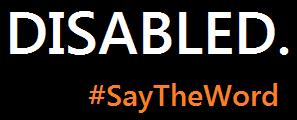
In our capitalist economy, our children with Down syndrome are seen by some as less than – not able to be “contributing” members of society.
So we fight.
We fight language in an effort to change perceptions. We fight against the “R” word because it demeans our loved one. We fight for person-first language in hopes that it will somehow convince people to care. We hope with all our being that saying our child is “a person who has Down syndrome” instead of “Down’s Syndrome child” will help society see the person before the label. Lately, we’ve even started using the phrase “happens to have Down syndrome,” perhaps hoping that people will see this person we love with all our hearts as we do – a human being – and not a drain on society at best, someone who should not have been born at worst. We cling to phrases like “More alike than different,” because we feel the only way to create change is to convince society that people with Down syndrome aren’t so odd that they should be made fun of, or worse yet, ignored.
People who have an intellectual disability have always been on the bottom of the disability hierarchy.
“People talk about Kris like she’s not even there,” she exclaimed. “I mean, she’s not retarded- she just uses a chair!” – The Disability Hierarchy, by Kathie Snow.
So, it’s possible that we, people who have Down syndrome and their families, may feel unwanted in some disability community circles. On the other end of the spectrum, some parents reject the notion that their child is disabled in any way, preferring terms like “differently abled.”
This conundrum is complicated even further by the fact that, we as parents, don’t really have the power to accept or deny a label for our children. If I was to ask my son about how he identifies, his answer would include his full name, sometimes. Other times he claims a name that describes how he’s feeling – he’s asked to be called Michael Jackson, Mr. MJ, and a few other iconic names. He’s more likely to identify as a “rock star” than any disability moniker even though he does know that he has Down syndrome. When it comes to politics, he knows who Barack Obama is, and recognizes the President on site. Other than that, he’s not bothered by the details.
So parents of people who have intellectual disabilities are in a difficult situation when it comes to claiming labels. Some of us claim membership in the Down syndrome community. We have our own advocacy groups and a sense of belonging to something bigger than ourselves.
The problem, as I see it, is that many of us no longer choose to align ourselves with the larger community of disabled persons. We still use terms like, high- or low-functioning. We save our advocacy energy for issues specific to people with Down syndrome, and often, specific to our own socio-economic or other status.
Some of our groups do reach out to other disability organizations – especially the autism community – when it comes to advocacy. That could be because a large portion of our population has a dual diagnosis – or it could just be good politics.
When disability advocate Lawrence Carter-Long started posting about claiming the disability label, I saw it as a call to political action, rather than a language preference.
DISABLED. #SayTheWord: Person first. Person last. Doesn’t much matter. What we’ve got to do is make sure the words “disabled” and “disability”–and the people they identify–are in the mix. Somewhere? Anywhere??? No. Every-freaking-where! Nothing without us. Period. You dig? The President shouldn’t be afraid to say “disabled.” Inclusion shouldn’t be an afterthought either. He and every other elected official should feel like we’re a constituency that they are going to have to reckon with. Businesses too. Schools as well. The movies we watch and the TV shows that are supposedly about “us” too. I’ll say it again: “NOTHING WITHOUT US. PERIOD.” Bottom line? If we’re afraid to say disabled, to own disability–ourselves–how
in the blue hell can we expect anyone else to take us, individually or as a group, seriously? It isn’t 1974 anymore. Disability is not a source of shame. Not for me. And not for millions of others. There is no longer a need to distance ourselves from it one iota. Those trails have been blazed. And I’m grateful for ’em. But time marches on. So does language. As does justice. It is 2016 and I am confident in my personhood. This idea, this evolving campaign, reflects that shift. Forty years of begging for a seat at somebody else’s table is long enough. It is time for disabled people to host the party, make up the guest list and invite who we want to be there. It’s also time for invitees to know that there will be consequences if they don’t come. If they don’t meet people with disabilities where *we* are. DISABLED. #SayTheWord. Posted by Lawrence Carter-Long on Thursday, January 14, 2016
Since then, others have weighed in and expanded on his idea using their own perspectives.
Jax Jacki Brown – #SayTheWord: Why I’m reclaiming the word ‘disabled’
Shawn Burns – People first vs identity first: a discussion about language and disability
While I understand the complexities that exist, I hope that there will be a discussion in our community about #SayTheWord.
Can we overcome the language issues and come together to claim the political power that comes with numbers?
Is it possible for parents to join the discussion without stepping on the voice of our children?
Can we be examples for others to follow by rejecting the shame associated with the word disabled?
Will you #SayTheWord?

1 thought on “Politics and Language. Can parents #SayTheWord ?”